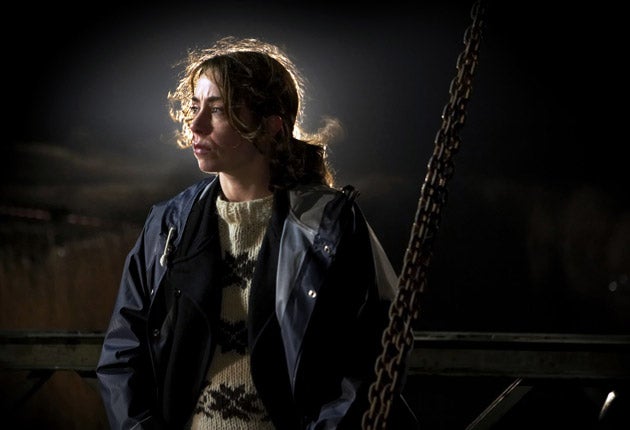The Killing, BBC4, Saturday<br/>Nuns Aloud, BBC1, Tuesday
The latest Scandinavian detective drama is dark and intense, and thoroughly deserves its rapidly growing audience

Your support helps us to tell the story
From reproductive rights to climate change to Big Tech, The Independent is on the ground when the story is developing. Whether it's investigating the financials of Elon Musk's pro-Trump PAC or producing our latest documentary, 'The A Word', which shines a light on the American women fighting for reproductive rights, we know how important it is to parse out the facts from the messaging.
At such a critical moment in US history, we need reporters on the ground. Your donation allows us to keep sending journalists to speak to both sides of the story.
The Independent is trusted by Americans across the entire political spectrum. And unlike many other quality news outlets, we choose not to lock Americans out of our reporting and analysis with paywalls. We believe quality journalism should be available to everyone, paid for by those who can afford it.
Your support makes all the difference.There are plenty of digs at Sweden in the Danish crime thriller The Killing.
"I had some friends who moved there once," remarks one character, only half-joking. "They went mad. It was too remote." Standard sibling rivalry between neighbouring countries? Or maybe a metatextual jibe at the bleak introspection considered characteristic of the contemporary Swedish crime fiction (think Henning Mankell and Stieg Larsson) that has so captivated viewers and readers around the globe.
Naturally, BBC4's latest European import has not avoided the Wallander comparisons, but the resemblance is not pronounced. There are no interminable brooding shots of reed-packed lakes, for a start. Now at the mid-point in its 20-episode run – its audience increasing weekly in both number and enthusiasm – the series traces the events following the brutal murder of a teenage girl.
By turns pacy and contemplative, though never overwrought, the narrative sets up an intensifying web of connections between her death and those caught up in its fallout. Taking in the police investigation, the family's private grief and a political intrigue whose contours are yet fully to emerge, the murder threatens to tug sharply at the loose threads of Copenhagen's mixed social fabric.
I won't reveal too much, since an iPlayer binge awaits those who have yet to tune in, but at the halfway mark the labyrinthine plot has already taken us down several dead ends while tantalisingly sketching the limits of the blind spots on which the stories ultimately converge.
That might be frustrating were it not for the fact that even the red herrings illuminate a theme. I'm told the Danish title also translates as "The Crime", a more accurate indicator of what is on offer. The killing itself is one among many crimes – legal, ethical, moral – committed by various characters. From the chequered past of the victim's father to the protocol-bending police efforts and the political manoeuvres of an election campaign, the question seems to be: what constitutes a crime? And does one crime always beget another?
Dark stuff, then, but more in the nature of the genre than evidence of national character, I think. If anything, The Killing recalls the French series Spiral, another top pick from BBC4, not least because it too benefits from a strong female lead, here in the form of detective Sarah Lund, played with incredible restraint and intensity by Sofie Grabol.
Lund is a singular creation. Against the usual quandaries of balancing work and family life, her responses are a break from the guilt-wracked norm. Refreshingly, there are no stock scenes of her peeping in on her sleeping son as she returns home late from work yet again. But nor is she painted as a power-hungry ball-breaker, apparently driven by an unsentimental empathy with the victim. A nice touch, underscoring this lack of narcissism, is that she seems set to wear the same jumper for the entire series – although she has a long way to go to match Wallander levels of dishevelment.
Nevertheless, The Killing can't bust every stereotype. That jumper, a natty Fair Isle, belongs to a generalised superior knitwear sensibility, and the most modest home settings are worthy of Elle Decor. The natural beauty quotient among the cast is high, and even the less physically blessed make up for it with interesting hair or quirky spectacles. As clichés go, however, I can live with those and I'm sure the Danes can too.
Though thrillers thrive on the mystery of what is not shown, I'm not sure it works as a modus operandi for a documentary. Nuns Aloud recorded a music label's search for a group of singing nuns to top the classical charts. The main stumbling block – both for record execs Tom and Olly and for the programme-makers – seemed to be the fact that many of the nuns they visited lived in cloistered communities where visitors were not permitted, let alone TV cameras.
The brief glimpses we did get were tantalising. The nuns who finally made the record – and succeeded in topping the charts – lived in an isolated, virtually self-sufficient community near Avignon, doing everything from farming to fixing their own electrical items, but there was little possibility of exploring their lives further.
The rhetoric was X-Factor-meets-MasterChef – "These aren't world-class nuns," said Tom of one community, clearly calibrating things on his own peculiar scale. The main criteria appeared to be a photogenic location and youth. Apparently, Gregorian chant sounds better with younger voices. It's rather depressing to learn that the world of plainsong is no less age-obsessed than pop.
Join our commenting forum
Join thought-provoking conversations, follow other Independent readers and see their replies
Comments